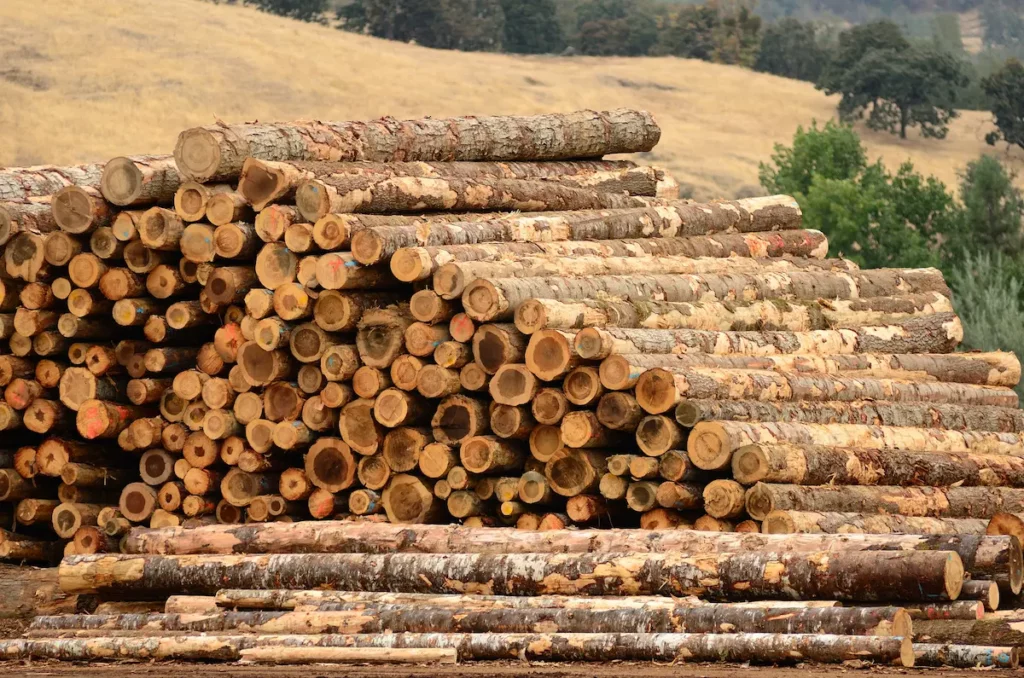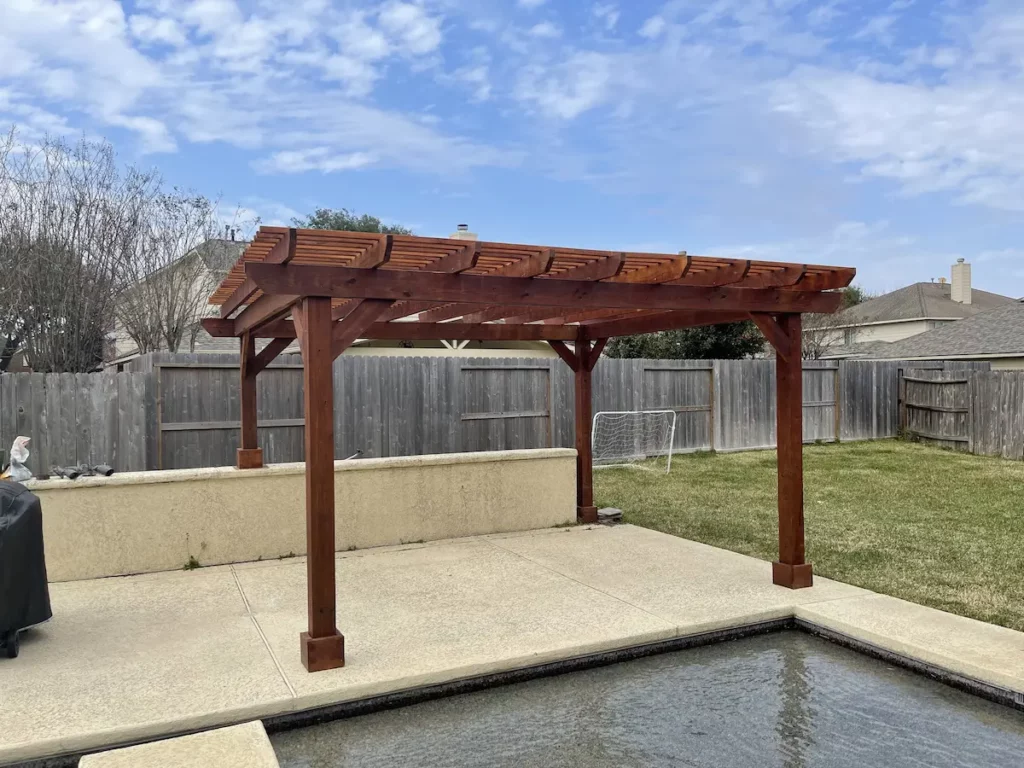Which is better, Douglas Fir or Cedar for a pergola?
On the one hand, Douglas Fir is stronger; however, it will be more challenging to maintain.
Conversely, Cedar will last longer, as it is better at resisting pests and rot, but it is more expensive.
You have two popular options when it comes to choosing the right material for your pergola: Douglas Fir and Cedar. But which is best?
Wondering if you should get Douglas Fir or Cedar for your pergola?
Our comparison will help you make the best decision on your next pergola.
There are several pros and cons to consider before you make your decision.
Keep reading to learn more about these wood choices and how to find the right one for you.

Related Article: Determining the Ideal Pergola Beam Size: Expert Advice
Table of Contents
Using Cedar for a Pergola
We will begin by determining which is best, Douglas Fir or Cedar, for a Pergola.
Let’s first consider Cedar’s pros and cons.
Pros
- Long-lasting. Cedar has natural oils in the wood that will stop insects from eating it and offer protection from rot. As a result, a pergola made from cedar should last many years.
- Many colors. There is a broader variety of Cedar from which to choose. This ensures that you can get a color that will suit your style. All you need to do is apply a few coats of varnish to preserve these natural colors for a long time.
- Works well in damp environments. If you are building in a high-humidity area, you might want to consider using Cedar. Cedar is resistant to environmental elements. It won’t swell or shrink.
- Sound resistance. Cedar is used in many homes for its sound reduction qualities. For a pergola, you can enjoy the outdoors by limiting unwanted sounds.
- Aroma. Cedar has natural oils, which cause its iconic aroma that last for years.
Related Article: Benefits of Using Cedar Wood
Cons
- Higher cost. When compared to Douglas Fir, Cedar will be significantly more expensive. Cedar may be cheaper than Redwood, but it is double the cost of Fir and Yellow Pine.
- Checking. Cedar does not expand with high humidity, but the wood will develop small cracks over time known as “checking,” which run parallel to the grain.
- The color can fade. You must make sure that you are treating the wood properly. If you don’t, the colors will fade, turning it silver-gray.
Related Article: Problems With Cedar Wood
Using Douglas Fir for a Pergola
Pros
- Strong. Douglas Fir can support a lot of weight, which is why it is frequently used to reinforce structures. Like Cedar, it can also withstand harsh outdoor conditions.
- Abundant. Douglas Fir is relatively easy to find in North America and vital for several reasons. You will reduce your environmental impact. This type of wood is also pretty economical and significantly less expensive than Cedar.
- Color. Like Cedar, Douglas Fir is known for its beauty. It is relatively easy to preserve, as you only need to apply a little stain.
- Grips nails well. Nails and screws will penetrate deeply into the Douglas Fir. Because of this, it will be easy to work with during the construction process.
Cons
- More susceptible to insects. Compared to Cedar, it is often less resilient to infestation. It doesn’t have any oils designed to protect it from insects.
- More maintenance. Because of the risks of rotting, you will need to spend a little more time with Douglas Fir. For example, you might need to get used to sanding and applying protective varnish.
Which Should You Choose, Douglas Fir or Cedar for a Pergola?
Both of these options are suitable for your pergola, but your choice depends on your expectations.
Generally, Cedar will be the best overall. It will cope well with the outdoor conditions and you won’t need to worry about the wood degrading over time.
However, if you are on a budget, it might be better to choose Douglas Fir.
While it won’t have the natural oils to protect it from insects, it will be solid and able to support a heavy load. The Douglas Fir will also be relatively affordable.
When planning to install a pergola, consider the location carefully.
If the area is prone to earthquakes or hurricanes, Douglas Fir is the best option for its strength.
If you are unsure which is best, Douglas Fir or Cedar for a pergola, maybe talk to your builder.
A lumber mill or home center may also be areas of information.
I have a friend who owns a lumber mill and can answer just about any question related to wood use.
These experts will be able to talk you through your options and point you in the right direction.
Related Article: Top 10 Reasons for Owning a Pergola

Douglas Fir or Cedar for a Pergola: Choosing Your Wood
Once you’ve settled on what type of wood you are going to use, there are a few other things you should look for when choosing.
Getting untreated wood is a good idea to ensure no harmful chemicals have been used.
When deciding on the design of a pergola, it’s important to consider the size and area of coverage needed, as larger areas will require a larger pergola and will be more expensive.
When deciding between Douglas fir and cedar for a pergola, consider the severe weather in your area, such as heavy winds, snow, or other inclement weather.
When choosing a color for your outdoor plans, consider the furniture you plan to use and pick a coordinating color that catches your eye.
The Douglas Fir and Cedar will have a range of colors you can pick.
Or you might decide to avoid this problem entirely by using paint.
Related Article: The Perfect Pergola Size: How to Make the Best Decision for Your Space!
Final Thoughts
When it comes to building a pergola, there are many wood options to choose from.
The good news is that Douglas Fir or Cedar for a pergola will do an excellent job.
Ultimately, the decision will be guided by cost, location, space, special conditions, and aesthetics.
Always keep safety at the forefront.
Enjoy living the outdoor life!
